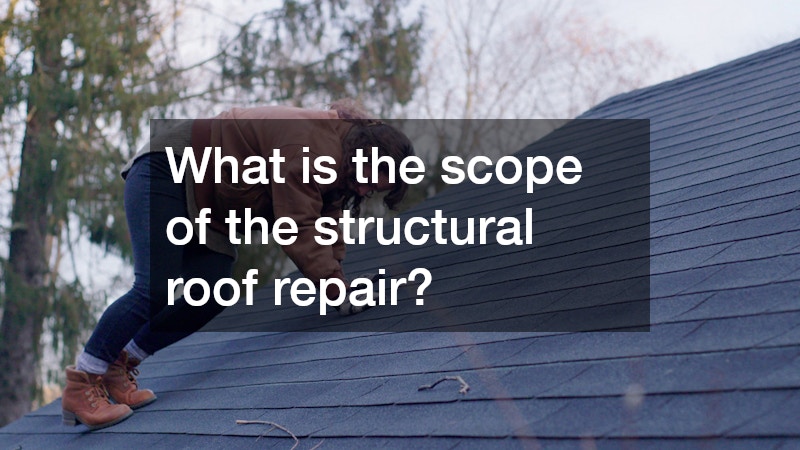12 Things To Ask About When Scheduling Structural Roof Repair
When it comes to maintaining your home, structural roof repair is one task you should never overlook. The roof is an essential component that protects your home from harsh weather conditions. Without a sturdy and well-maintained roof, your home’s interior and exterior are both at risk. Understanding the critical aspects of structural roof repairs can help you ensure the durability and safety of your home.
This comprehensive guide will provide you with valuable insights and essential questions to ask when scheduling a structural roof repair. From hiring the best roofing contractors to choosing between roof replacements and repairs, getting detailed information beforehand ensures a seamless and effective repair process. By the end of this article, you will feel confident and informed about making decisions that affect the integrity of your home’s roof.
1. What Is The Scope Of The Structural Roof Repair?

The first and foremost question to ask is about the scope of the project. Understanding the extent of the structural roof repairs will give you a clear picture of what needs to be done. A thorough assessment conducted by a professional can help in obtaining this information accurately, as they can identify both visible and hidden damages.
Roof inspectors can determine whether your home needs a minor patch job or extensive repairs. A roof inspection will also help uncover potential issues that may not be immediately apparent, saving you money and hassle in the long term. Before initiating the repair, it is crucial to have a clear and detailed scope of work outlined in writing to avoid any future misunderstandings.
Having clarity about the structural integrity of your roof also helps in budgeting the repair. Different roofing contractors might offer varying scopes based on their expertise and experience, hence comparing them will ensure you choose the most reliable service. Remember, cheap doesn’t always mean good; the goal should be quality repairs that guarantee the longevity of your roof.
2. What Is The Estimated Timeline For The Repair?
Another important piece of information is the timeline for completing the structural roof repairs. Understanding the duration helps in planning your daily activities, especially if the repair work disrupts your home environment. Most small repairs can be completed within a day, while larger, more involved jobs may require several days or even weeks.
Check with the roofing contractors about the estimated timeline for completion, considering the complexity of the project and weather conditions. Delays can occur due to unpredictable weather or unexpected complications arising during the repair process. Nonetheless, having a ballpark figure ensures that you have a basic schedule to follow.
The timeline also influences the choice of a local roofing company since you may prefer to hire one that offers a faster turnaround time. However, keep in mind that efficiency should never compromise the quality of the craftsmanship. Patience might be required, but the safety of your home is well worth the wait.
3. How Much Will It Cost?
Cost is a significant factor in any home project, and structural roof repairs are no different. It’s wise to obtain quotes from multiple roofers to ensure you are paying a fair price. Factors influencing the cost include the extent of damage, the materials needed, and the labor involved.
Seek a detailed breakdown of all costs upfront, so there are no surprising expenses once work begins. Some companies might offer packages that include gutter repairs or additional roofing services at a discounted rate, which could be beneficial. While it could be tempting to select the cheapest option, the quality of repair should always be the top priority.
Don’t hesitate to ask about payment plans or financing options if the repair is particularly pricey. Often, a home remodeling company will work with financial institutions to offer flexible terms. Understanding the financial aspect allows you to manage your expenditures better while ensuring your home’s structural integrity is not compromised.
4. What Experience Do You Have With Similar Projects?

The experience of roofing contractors in dealing with structural roof repairs similar to yours is crucial. Expertise can differ greatly between residential and commercial roofers, so ensure the contractor is qualified for your specific needs. Ask for examples of past projects, preferably with references or testimonials from satisfied clients.
Experienced contractors are more likely to foresee potential issues and resolve them before they become larger problems. Specialization in certain repair types, for example, metal roof repairs, indicates advanced knowledge, which could be beneficial depending on your specific roof type and material.
Evaluating the contractor’s past performance not only ensures they have the skills necessary for your repair but also provides peace of mind. Trustworthiness and reliability are essential shades of professionalism, enhancing your confidence in the repair process and outcome.
5. Are You Licensed And Insured?
Hiring a licensed and insured local roofing company is non-negotiable when scheduling structural roof repairs. Licensing ensures that the contractor adheres to local regulations and industry standards. It’s a testament to their competency, which cannot be overlooked.
Insurance protects both parties from potential liabilities, such as worker injuries or accidental property damage. Always request to see the contractor’s license and insurance documents before work commences. Verifying their validity can prevent unforeseen issues and ensure compliance with legal requirements.
Additionally, working with licensed and insured professionals signifies professionalism and reduces the risk of being scammed. In situations where there is unintentional damage or mistakes during repairs, insurance covers the costs associated with mitigating such problems.
6. Do You Offer Warranties?
A reputable roofing service will offer warranties on both materials and workmanship, a critical component to consider when scheduling repairs. Warranties are your safety net, ensuring that if problems arise after repairs, the contractor will revisit and rectify them.
Different companies may offer varying lengths and types of warranties. Some might focus only on labor costs, while others cover both labor and materials. Understanding the specifics of these warranties will prevent headaches if issues do occur after the work is finished.
Make sure to have the warranty details documented and understood before agreeing on the contract. Knowing that protective measures are in place helps in feeling safe and secure that the structural roof repairs are built to last and withstand future issues.
7. What Kind Of Roofing Materials Do You Use?

The materials used in structural roof repair can significantly influence the durability and appearance of your roof. You should ask about the types of materials commonly utilized for repairs and weigh the pros and cons of each type. This is especially relevant if your repair involves transitioning from one material to another, such as switching to metal roof repairs.
Some materials might be more durable or cost-effective than others, so discuss your preferences and budget with your contractor. Request sample materials or visual examples to make an informed decision that aligns with your aesthetic and functional goals. Proper materials combined with skilled craftsmanship ensure a result that is not only beautiful but also resilient.
Moreover, your choice of material could influence the urgency of future roof replacements. High-quality materials might cost more upfront but could extend the life of your roof significantly, saving you money over time. Thus, it’s crucial to align on the best materials upfront during the repair planning phase.
8. Will You Handle Cleaning And Disposal?
Structural roof repairs can leave behind considerable debris in the form of old materials and waste. Inquire whether your roofing contractors include cleanup and disposal as part of their service. Leaving your property in a clean state after repairs should be a standard practice.
Some companies may charge extra for debris removal while others include this in the initial quote. Ensure the terms are clear to avoid surprises. A well-defined cleanup plan implies professionalism and commitment to customer satisfaction, often overlooked but incredibly important.
Enquiring about their cleanup policy helps ease logistical planning post-repair, like arranging a pressure cleaning business if needed. An organized work area and a thorough post-service clean-up reflect high standards of service and effort, essential when investing in your home’s structure.
9. How Will The Repair Impact My Homeowners Insurance?
Reporting structural roof repairs to your home insurance is crucial, but understanding the implications for your policy needs careful consideration. Not all repairs will affect insurance premiums, but it’s wise to clarify this with your insurer to avoid any future discrepancies.
Insurance coverage might offer benefits for certain types of repairs, such as those preventing further damage or after natural disasters. Clarification with your insurance provider enables you to leverage possible discounts or rebates, thereby reducing out-of-pocket expenses.
Keeping detailed documentation of repair estimates and invoices can be useful in any dispute or claim situations later on. Understanding your policy’s specifics related to roof repairs empowers you to make informed, financially sound decisions, ensuring the protection of your home assets.
10. Can You Recommend Any Preventative Maintenance?

Post repair, it’s invaluable to inquire about preventative maintenance measures to extend the lifespan of your newly repaired roof. Some roofing companies will offer maintenance packages involving seasonal inspections or minor adjustments as needed.
A regular check and maintenance routine can spot early signs of wear that might otherwise go unnoticed. Simple practices, like periodic gutter repairs and clearing debris, ensure smooth water runoff, preventing waterlogged materials from causing more damage.
Additionally, routine roof inspections can unearth developing issues early, preventing costly repairs in the future. Investing in preventive care of your roof can be a wise financial decision, providing more peace of mind in the long run.
11. How Can I Prepare My Home For The Repairs?
Preparing your home for structural roof repairs can help streamline the process and protect your belongings. Ask your contractor for tips on pre-repair preparations to minimize disruptions. Moving fragile items from the walls or ceiling where workers will be active is typically advised.
Consider precautions like covering furniture and delicate objects if you have repairs inside as well as outside. Openly communicating with your roofing contractor about specific home features that may require extra attention will ensure nothing is accidentally damaged during the process.
Additionally, ensuring clear outdoor access for roofers simplifies their task, providing them with better mobility around the site. Thoughtful planning and organization can smooth the repair process, ensuring continuity and protecting your home environment during the transition.
12. Will You Follow Up After The Repair Is Completed?
A reliable local roofing company should offer a comprehensive follow-up to assess your satisfaction with the completed work. Follow-ups provide an opportunity to catch minor issues early and ensure that your expectations have been met. Discuss scheduling a post-repair check to confirm the quality and durability of the repairs conducted.
Post-repair interactions are also an opportunity to revisit preventative maintenance advice shared initially. Roofing companies often value customer feedback which helps them maintain or improve service standards. Create open communication channels for any concerns that may arise post-repair.
Having a dedicated point of contact even after conclusion ensures that any latent issues or concerns receive prompt attention. The value placed on aftercare initiatives speaks volumes about the company’s dedication to customer service and repair excellence.
Structural roof repairs require careful consideration, planning, and a strategic approach to ensure your home remains safe and protected from the elements. By asking these twelve essential questions, you can make informed decisions that best suit your roofing needs. Invest the time in understanding the process and finding the right professionals to carry out the work, securing your home’s integrity for years to come.
Evaluating different roofing service options, encompassing a combination of skills, materials, and guarantees, strengthens your position as an informed homeowner. Partnering with reputable roofing contractors or a trusted local roofing company ensures optimal results. Always prioritize quality and safety when embarking on a roof repair journey.
Incorporate these insights into a comprehensive preparation strategy for structural roof repairs, allowing your home to withstand external adversities while enhancing its structural integrity. Being proactive in roof care fosters a secure and worry-free living environment for you and your family.

